Are you planning your dream holiday to Italy but feel nervous about the language? Don’t worry, here’s a little survival kit for your trip!
Traveling to a country where your native tongue isn’t spoken can be challenging. Learning some simple Italian phrases for travel can make a difference in how enjoyable your trip will be. Because let’s face it, if you can’t communicate, a dream holiday can easily become a nightmare if you’re lost and can’t ask for directions. Just a few phrases can help you become more confident. Not to mention that locals will genuinely appreciate your efforts, even if you only know a few words.
So, here are my top 25 essential Italian phrases for travel divided by topic and complete with some real-life examples. You can memorise or save them on your phone, so you always have them with you in a pinch.
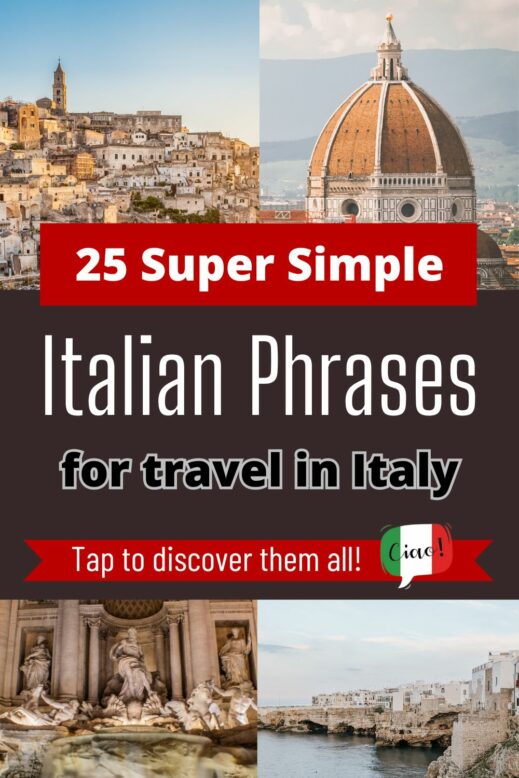
A quick note about the Italian formal/informal tone
In Italy, we differentiate between formal/informal tones depending on the familiarity with the person you’re talking to.
As a general rule:
- the formal tone is used for business, in shops, when you don’t know someone well, and when you’re talking to an older person.
- the informal tone is used when you’re talking to friends, family, and kids
In this guide, you’ll find both tones for each phrase.
Part 1 – Understanding
It’s especially important to raise a hand when you have no clue what people are saying. After all, it’s not your language and it’s perfectly okay not to understand.

Scusa, non capisco (informal) / Scusi, non capisco (formal)
English: Sorry, I don’t understand
Use this simple Italian phrase if you don’t understand what someone is saying. You could also make it longer by saying Scusa, non capisco, non parlo molto bene italiano (Sorry, I don’t understand, I don’t speak Italian very well).
Puoi ripetere per favore? (informal) / Può ripetere per favore (formal)
English: Can you repeat please?
Sometimes the other person may talk too fast or use a word you’re not quite sure of. This phrase lets you ask someone to repeat themselves so you can catch what they’re saying.
Parli inglese? (informal) / Lei parla inglese? (formal)
English: Do you speak English?
When you don’t feel comfortable speaking Italian, use this phrase to ask if the other person speaks your language. There are three possible answers: Sì (yes) / Sì, un po’ (Yes, a little) / No, mi spiace (No, sorry).
Part 2 – Asking for directions
Who needs to ask for directions when there’s Google Maps? I know, but hey, we’ve all made mistakes at some point, even with Google Maps on our side. Plus, your phone’s battery may die, leaving you clueless about where to go. These are some basic Italian phrases tourists can use when they’re lost.

Dov’è…?
English: Where is… ?
If you’re having trouble finding your way, get a stranger’s attention (Mi scusi! – Excuse me) and ask “dov’è…?” The dots can be anything – the Trevi Fountain (Dov’è la Fontana di Trevi?), the metro (Dov’è la metro?), the toilet (Dov’è il bagno?) You can expect simple answers like a destra (to the right), a sinistra (to the left), sempre dritto (straight on), etc.
Come si arriva a… ?
English: How do I get to…?
If you don’t know where to go, this is a great phrase to use, especially if you have a map with you and the person can show you the directions. Again, grab their attention and ask the question: Mi scusi, come si arriva alla stazione? (Excuse me, how do I get to the train station?)
Quanto dista… ?
English: How far is… ?
Imagine you’re on the side of the road with no map and no idea how to get to the metro station. Here’s what you can say: Mi scusi, quanto dista la metro più vicina? (Excuse me, how far is the nearest metro station?).
Part 3 – Transport & tickets
No list of Italian phrases for tourists would be complete without some key expressions for moving around. Whether you travel by train, bus, taxi, or a rental car, you need to be able to ask basic questions that will make it easier to get to your sightseeing destinations, whether you be spending 2 or 3 days in Cinque Terre or a weekend in Rome.
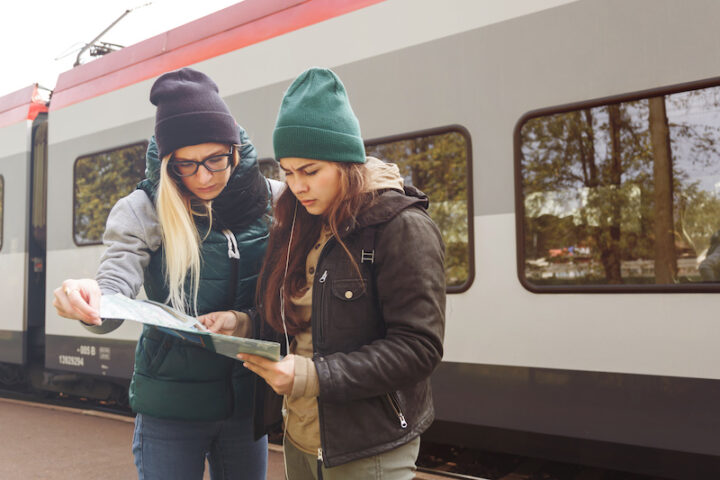
A che ora arriva / parte il treno?
English: What time does the train arrive / leave?
This is a really useful question to memorise if you plan to travel around the country by public transportation.
Un biglietto per…
English: A ticket to….
When buying a train / bus ticket, make sure you specify if you need a one-way (solo andata) or round-trip (andata e ritorno). For example: Un biglietto per Milano per favore, solo andata (A one-way ticket to Milan, please).
Si può parcheggiare qui?
English: Can I park here?
Whenever you’re driving and need a parking spot, this is a very important question. The parking spaces in Italy are colored differently (blue is for paid street parking, yellow is for disabled and residents, etc.), so it’s always better to double check to avoid fines.
È questa la fermata per…?
English: Is this the right stop for…?
There aren’t always announcements with the name of the next stop on buses, trains, or trams, so this phrase will save you from getting off at the wrong place: Mi scusi, è questa la fermata per il Colosseo? (Excuse me, is this the right stop for the Colosseum?).
Ethics statement: Below you will find an affiliate link. If you buy something after clicking the link, we will receive a small commission. To know more about our ethics, you can visit our full disclosure page. Thank you!

Are you interested in improving your Italian in a fun and stress-free manner? Then we highly recommend Serena Capilli’s short stories in Italian (affiliate link), designed for beginners, advanced beginners, and lower intermediate learners (A1-B1 CEFR). These stories have been optimised for English speakers in search of a fun, laid-back learning experience! Read our full review here.
Part 4 – Shopping
You’ll need to buy something at some point during your vacation, whether it’s food, souvenirs, or something else. Get out there and enjoy your shopping with these simple Italian phrases.

Quanto costa?
English: How much is it?
Whenever you’re shopping or buying tickets, use this phrase to find out how much something is. Use the plural if you’re referring to multiple things: Quanto costano? (How much are they?).
Posso provarlo?
English: Can I try this on?
You’ve got your eye on a brand-new top, but you’re not sure if it fits? Just ask Mi scusi, posso provarlo? and you’ll be shown the fitting room. The question changes if you’re referring to a feminine word (Posso provarla?) or to multiple things (Posso provarli/e?)
Si può spedire? / Si possono spedire?
Can you ship this? / Can you ship these?
What if you want to buy that yummy wine from the small family winery you just visited, but your luggage is already full? You ask if the bottles can be shipped!
Posso pagare con carta di credito?
Can I pay with credit card?
Never assume that you can pay by credit card, because small businesses like market stalls, trattorias, and coffee shops often don’t have (or don’t want to use) credit card machines. Make sure you always carry cash with you.
Part 5 – Accommodation
While hotel staff typically speaks different languages, knowing some basic Italian phrases can prove to be a game changer when you stay in B&Bs and guesthouses, where hosts don’t always speak English well.
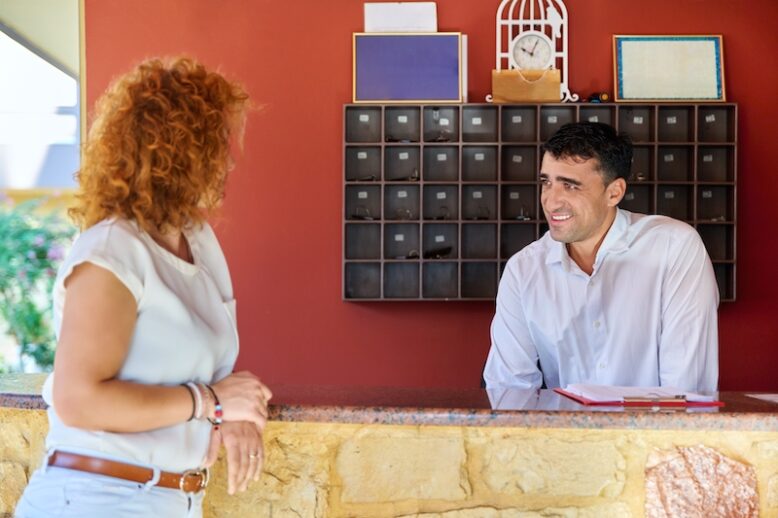
Possiamo lasciare i bagagli qui?
English: Can we leave our bags here?
Use this phrase if you’re arriving early or leaving late to make sure you can leave your luggage at your accommodation.
A che ora è la colazione?
English: At what time is breakfast?
This is a key question if your room rate includes breakfast – you don’t want to miss your cornetto and cappuccino, do you?
Non funziona l’acqua calda / l’aria condizionata / il WiFi
English: The hot water / the air conditioning / the WiFi doesn’t work
If something’s not working in your room, use this phrase when talking to the management. You could say: Non funziona l’acqua calda, può aiutarmi per favore? (The hot water doesn’t work, can you please help me?)
Part 6 – At the bar/restaurant
Eating is an important part of any trip to Italy, and adding a little Italian to your dining experience makes it all the more fun!

Vorrei un caffè / una pizza
English: I would like a coffee / a pizza
When you want to place an order, this is what you say. If you’re not sure what an item is called, you can say Vorrei and point to a menu item, followed by Grazie.
Qual è la specialità locale?
English: What’s the local specialty?
I highly recommend you ask this because every region in Italy has its own unique local specialties. So, let the waiter guide you, it’ll make your trip more memorable.
Sono allergico/a a… / Sono vegetariano/a / Sono vegano/a
English: I’m allergic to… / I’m vegetarian
These phrases are perfect for tourists who can’t eat certain types of food due to dietary restrictions. To express allergies, you can say Sono allergico/a ai latticini (dairy products) / alle noci (nuts) / al glutine (gluten). And if you’ve stopped eating meat, you could also say Non mangio carne (I don’t eat meat).
Quant’è?
English: How much is it?
This expression is usually used when you’re asking for the total amount you need to pay. This is the phrase to use, for example, if you’re at the bar and you’re paying for drinks for your group (just make sure you know the Italian numbers!)
Il conto, per favore
The bill/check, please
Il conto means the check and per favore means please in Italian. Just say this phrase when you’re ready to leave, and your check will be delivered right to your table. It’s not uncommon to see Italians say Il conto, per favore with a hand gesture similar to signing (you know how we love hand gestures here!).
Part 6 – Emergencies
As with everywhere else in the world, dangers can arise. You might find these phrases helpful in the – hopefully unlikely – event of an emergency, so memorise them just in case.

Aiuto!
English: Help!
Simple and straight to the point. Yell it if someone tries to hurt or rob you. You could also say: Aiuto, polizia! (Help, police!).
Mi hanno rubato il portafoglio / il passaporto
English: They stole my wallet / my passport
If someone steals your stuff, use this sentence to report it.
Ho perso il portafoglio / il passaporto
English: I lost my wallet / my passport
You can say this phrase to get help if you lose your belongings.
Did you enjoy these super simple Italian phrases for traveling? Let us know when you’re planning to travel to Italy in the comments below!
Valentina is a travel writer in love with her country. Having travelled widely around the globe, she realised there was more to explore closer to home and decided to put the passport aside for a while. You can follow her adventures around Italy on her blog myitaliandiaries.com.
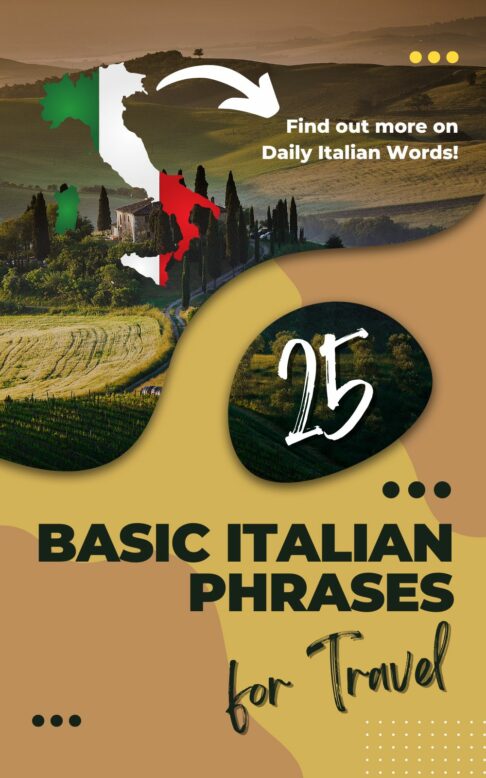
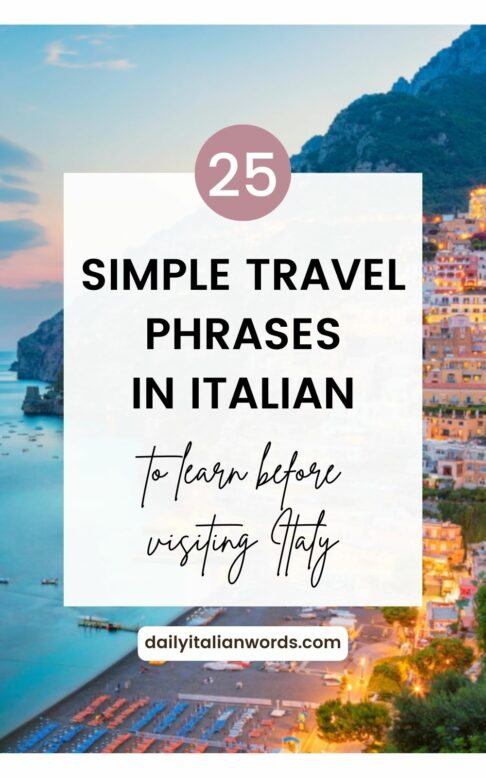
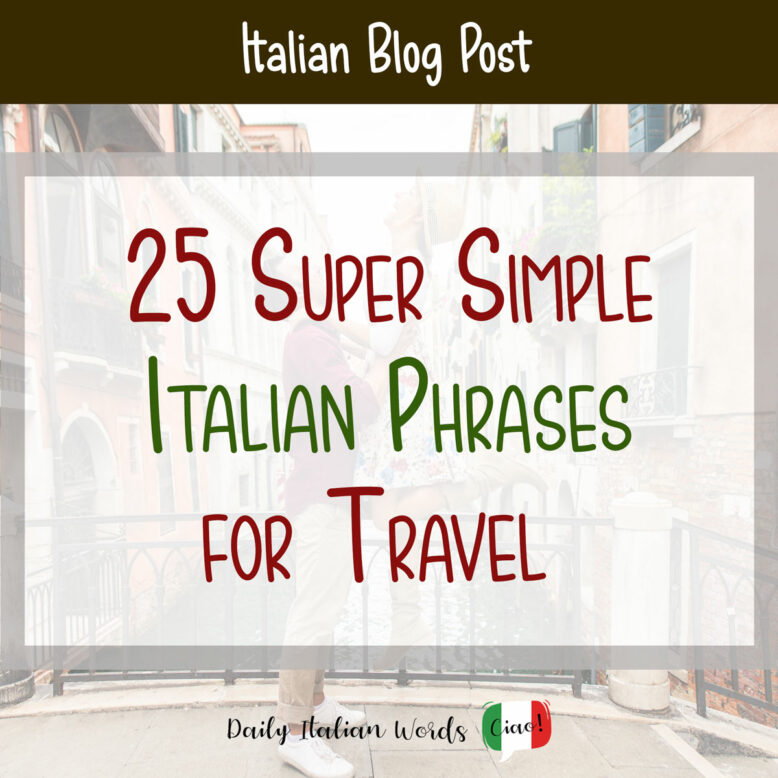

Valentina Nicastro is a travel writer in love with her home country, Italy. Having travelled widely around the globe, she realised there was more to explore closer to home and decided to put the passport aside for a while. When she is not immersed in documenting Italy, you’ll find her donning her communication consultant hat, weaving words as a content writer and bridging linguistic divides as a translator.

